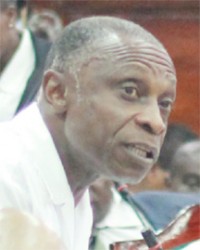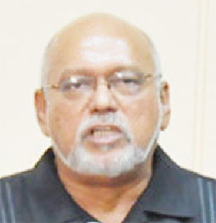Government is the only party yet to submit the names of its nominees for the long-delayed Public Procurement Commission (PPC) to the Public Accounts Committee (PAC) of the National Assem-bly, Committee Chairman Carl Greenidge revealed yesterday.
He said that main opposition APNU has submitted the names of its nominees along with Curriculum Vitae (CV), and the AFC has submitted the names of its nominees but not their CV. The government has submitted neither, he added.
On Friday, when asked what was holding back the appointments of the constitutionally-mandated bodies such as the PPC and the Office of the Ombudsman, President Donald Ramotar told a news conference that he intend to engage the opposition on these issues. “I intend again to very soon to speak to the opposition about some of these issues…some… have to have parliamentary input,” he said.

Controversies surrounding the award of large government contracts have seen frequent calls for the establishment of the PPC over the last decade, during which time the nomination process has been stalled at the parliamentary level. Local and international bodies have called for the establishment of the PPC, in light of pervasive reports of corruption in the procurement process.
Government has in the past accused the opposition of holding up the process though earlier this year, presidential adviser on governance Gail Teixeira told Stabroek News that there are more important things on the government’s agenda than the PPC.
On Friday, Ramotar said that some of the bodies have to have parliamentary input. “In those where the buck stops here at me, I intend to try to work to resolve those issues as early as possible,” he added. The president said that he has his views on some of the issues but does not want make these public at this time and wants the opposition to appreciate his position on some of these issues and hopefully they can settle them and move forward.
He pointed out that thus far, they have had consultations on the Chancellor of the Judiciary and the Chief Justice but did not reach agreement. He said that he intends to pursue these matters and try to bring them to an early conclusion now that budget has been passed.
When contacted yesterday in relation to the PPC, Greenidge told Stabroek News that a process has to be followed before the PPC reaches the president for establishment. “Right now, he has to submit the names of his nominees,” he said. He pointed out that the administration has not yet submitted the names of its nominees. Greenidge said that the governing party was written to and the PPP/C also has representatives on the PAC so they are aware of their obligations.
The long-called for commission will specifically have oversight over the procedures of ministerial, regional and national procurement entities as well as those of project execution units. The commission will also investigate complaints from suppliers, contractors and public entities and cases of irregularities and mismanagement, with the power to propose remedial action in all instances. According to Article 212 X (1) of the constitution, the commission shall comprise five members, “who shall have expertise and experience in procurement, legal, financial and administrative matters.”

The President is required to appoint the members after such members have been nominated by the PAC and approved by not less than two-thirds of the elected members of the National Assembly.
Earlier last year, the parties had agreed to arrive at the names of the members of the long-delayed PPC via consensus and on May 10, 2012 Minister of Foreign Affairs Carolyn Rodrigues-Birkett had announced in the National Assembly that that it would be established by the end of June 2012. However, this deadline was not met.
Greenidge has said that he can do nothing in the interim but wait on the political parties to make their formal nominations.
Last year, former PPP/C stalwart and former Speaker of the National Assembly Ralph Ramkarran, in an article in the Sunday Stabroek, said that the test of the PPP’s commitment against corruption is the establishment of the PPC. He had pointed out that the law was passed ten years ago and recalled that at first the party blamed the PNC for insisting that there must be consensus on all the members, instead of the party nominating three and the PNC two, as for other commissions.





